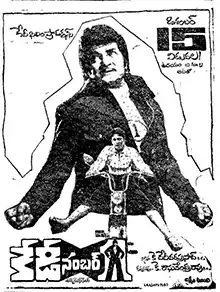KD No:1
KD No:1 is a 1978 Indian Telugu-language action film, Produced by K. Devi Vara Prasad under the Devi Film Productions banner and directed by K. Raghavendra Rao. It stars N. T. Rama Rao and Jayasudha, with music composed by K. V. Mahadevan. The film is a remake of the Hindi film Dus Numbri (1976).[1]
| KD No:1 | |
|---|---|
 Theatrical release poster | |
| Directed by | K. Raghavendra Rao |
| Produced by | K. Devi Vara Prasad |
| Written by | D. V. Narasa Raju (dialogues) |
| Screenplay by | K. Raghavendra Rao |
| Story by | S. Ali Raza |
| Based on | Dus Numbri (1976) |
| Starring | N. T. Rama Rao Jayasudha |
| Music by | K. V. Mahadevan |
| Cinematography | A. Vincent |
| Edited by | Kandaswamy |
Production company | Devi Film Productions |
Release date |
|
Running time | 125 mins |
| Country | India |
| Language | Telugu |
| Box office | ₹80 lakhs(equivalent to ₹17 crores in 2019) |
Plot
The film begins on Krishna (N. T. Rama Rao) notorious as KD No.1 one that intimidates gangsters. He is in search of a gang circulating fake currency by which his family esteem is denounced. As a result, his father Inspector Rama Rao (Mikkilineni) is sentenced and his mother Shantamma (Anjali Devi) is suffering in the mental hospital. Once, Krishna gets acquainted with petty thief Lilly Ratnam (Jayasudha) and they fell in love. Concurrently, Shantamma reacts to Lilly by calling her as Sundari. Immediately, Krishna seeks Lilly's father Johnson (Mukkamala) then he replies that earlier one of his fellow burglar Jaggu (Bheema Raju) bequeathed Lilly to him. Right now, in the association of Lilly Shantamma recovers. At the same time, Jaggu returns, captures Lilly and mortgages with her real father Ram Prasad (Prabhakar Reddy) when Krishna saves her. Thereafter he hands over to Ram Prasad who recognizes her as she resembles her mother Sundari (again Jayasudha). Here, Krishna realizes that the chair behind the fake currency is Ram Prasad. So, he decides to bolt him, progressing Krishna learns I.G. Yugandhar (Jaggayya) a candid is the real blackguard. Soon, he meets his father in prison and he narrates the past. Indeed, Rama Rao, Ram Prasad, & Yugandhar are close friends. At a point, Rama Rao detects Ram Prasad as a gangster and rounds up him. Being cognizant of it, Yugandhar indicated Rama Rao in the crime of the same fake currency. Knowing it, Sundari decides to divulge the truth when on the ordinance of Yugandhar, Jaggu slaughtered her and absconded with Lilly. In that mishap, Shantamma lost her consciousness. Just after, Krishna makes a play, by creating better fake currency for which Yugandhar seizures Shantamma and double-crosses Ram Prasad. At last, Krishna valorously encounters him and proves his father's innocence. Finally, the movie ends on a happy note with the marriage of Krishna & Lilly.
Cast
- N. T. Rama Rao as Krishna
- Jayasudha as Lilly Ratnam / Sarada & Sundari (dual role)
- Satyanarayana as Head Constable Venkata Swamy / C. B. I. Officer Sadasiva Rao
- Jaggayya as I. G. Yugandhar
- Anjali Devi as Shantamma
- Prabhakar Reddy as Ram Prasad
- Mikkilineni as Inspector Rama Rao
- Mukkamala as Johnson
- Mada as Chitchat
- P. J. Sarma as Doctor
- Chalapathi Rao as Inspector Mohan Rao
- Jayamalini as Dorasani Narsamma / Geetha Chowdary
Soundtrack
| KD No:1 | ||||
|---|---|---|---|---|
| Film score by | ||||
| Released | 1978 | |||
| Genre | Soundtrack | |||
| Length | 19:40 | |||
| Label | SAREGAMA Audio | |||
| Producer | K. V. Mahadevan | |||
| K. V. Mahadevan chronology | ||||
| ||||
Music composed by K. V. Mahadevan. Music released by SAREGAMA Audio Company.
| S. No | Song Title | Lyrics | Singers | length |
|---|---|---|---|---|
| 1 | "Yes Nene No:1" | Acharya Aatreya | SP Balu | 3:18 |
| 2 | "Sarigama Padanisa" | Veturi Sundararama Murthy | SP Balu, P. Susheela | 3:11 |
| 3 | "Aakalundadu" | Veturi Sundararama Murthy | SP Balu, P. Susheela | 3:14 |
| 4 | "Malli Malli" | Veturi Sundararama Murthy | SP Balu, P. Susheela | 3:20 |
| 5 | "Merakeedhi Mallini" | Veturi Sundararama Murthy | SP Balu, P. Susheela, G. Anand | 3:17 |
| 6 | "Poonindiro Polerama" | Acharya Aatreya | S. Janaki | 3:20 |
References
- Kohli, Suresh (19 December 2013). "Dus Numbri (1976)". The Hindu. ISSN 0971-751X. Retrieved 15 February 2020.